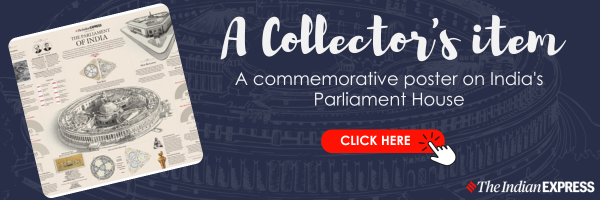Voices from the House — MPs recall memories at Parliament
Members of Parliament cutting across parties and states share with The Indian Express their thoughts and memories as the nation transitions to a new Parliament building.

Recalling one of his fondest memories of the old Parliament building, 92-year-old MP Shafiqur Rahman Barq says, “I was doing wuzu (ablutions before namaz) in one of the washrooms, when (Congress leader) Rahul Gandhi walked in. Manmohan Singh was the Prime Minister then. … Rahul asked me if there was a designated space for namaz in the building. When I told him that there was no designated place for namaz in the Parliament and that I usually offered prayers wherever I found space in the galleries, he appeared surprised. I went on to ask him for help so that MPs and others could have a dedicated space to offer namaz inside the building.”
The Samajwadi Party MP from Sambhal added, “Though the old Parliament building was built before Independence, it is still very beautiful.”
“Before I became an MP, I had entered the Parliament several times as an MLA from Uttar Pradesh. But the feeling of entering the country’s Parliament as an MP (in 1996) for the first time is different. I will never forget that moment or that day,” the 92-year-old recalled.
The veteran politician added, “I don’t think there was any need to build a new Parliament. The old one has all the facilities (one requires). We should have continued using that building. Also, our economy is struggling. That money could have been spent on helping the poor and deprived sections of society.”
– As told to Asad Rehman

As we transition from the old to the new Parliament building, it should remind us of the duties and responsibilities we carry and the historic legacy we need to take forward. From the days of the Constituent Assembly to the present, the Parliament has shaped the destiny of the nation and has been a testament to our democracy.
Stepping into the Parliament as a first-time MP was a profound experience because it was here that impassioned debates have taken place over milestone events like the India-China War of 1962, India’s victory over Pakistan in 1971, the nuclear tests of 1974 and 1998, the India-US nuclear deal and important Bills. Elected representatives across party lines have been involved in deliberations and policy decisions that have defined our nation on its evolutionary journey.
The Parliament is a constant reminder of Indians I admire and aspire to emulate in my own career. It symbolises the weighty responsibility we have as advocates for the people we represent, be it as a direct representative in the Lok Sabha, or through state representation in the Rajya Sabha. Over the years, the Parliament has seen power shifts, the rise and fall of the mighty and the triumph of the underdog.
While the new Parliament building represents progress and modernity, it is impossible not to be nostalgic about what we leave behind.The memory of fierce women parliamentarians like Sarojini Naidu, Indira Gandhi, Sushma Swaraj, Mamata Banerjee, Gayatri Devi, Rajmata Scindia and Sonia Gandhi lingers in these chambers. It has been a privilege to represent women’s causes, following in the footsteps of Speakers like Meira Kumar and Sumitra Mahajan. From acknowledging women MPs in parliamentary questions with gender-neutral language to addressing the issue of online harassment, these walls have heard our voices.
Of course, I cannot but mention some unforgettable speeches, be it Atal Bihari Vajpayee’s poignant address when his government fell in 1998 to Jawaharlal Nehru’s iconic “Tryst with Destiny” speech, Laloo Prasad Yadav’s humour, Sushma Swaraj’s articulate oratory and Indira Gandhi’s briefing on the 1971 war. Notably, the joint session of Parliament on the Goods and Services Tax (GST) also stands out as a significant moment. The fact that I was able to highlight critical citizen issues such as COVID-19, inflation and the contentious farm laws, which were eventually repealed due to public pressure, reaffirmed my faith in the Constitution.
As long as we are committed to who we are, uphold our civilizational legacy, and protect the principles of our Constitution, India will continue to be a thriving democracy.

Spending nearly 30 years as an MP in this historic building, I have developed an emotional attachment to it. In all these years, there have been several changes in the country’s political life. But the one big change that I have noticed in Parliamentary affairs is the way members engage with them now.
I came to the Lok Sabha for the first time in 1989 and I have been here since, except between 2009 and 2014. The Parliamentarians from whom I learnt a lot included Sh NG Ranga (a freedom fighter, he was an MP in both houses between 1952 and 1991, for different durations. He also founded the Swatantra Party). When I first came in, he was an MP from Guntur and that was his last tenure. He was almost 90 years old at the time but he would sit through all the proceedings, listening intently to whichever member was speaking. To a newcomer, his sincerity was awe-inspiring.
At that time, however, a majority of the members were like that — even if they were not speaking, they would attend proceedings, sitting for entire days listening to others. They would then move to the library to study various issues before making any comment or rejoinder. After this kind of rigorous preparation, when someone spoke, it carried heft.
These days, many members do not attend the House. They miss proceedings, stay away from question hour and lack the seriousness that affairs of the Parliament demand. The few occasions they do turn up, it is to speak or to ask questions. When that is done, they leave immediately.
Members should read about the active parliamentary lives of leaders such as Atal Bihari Vajpayee, LK Advani, George Fernandes and many others from across a spectrum of parties. These days, I notice an interest in proceedings from some members of the Biju Janata Dal. That is a good sign. Otherwise, MPs seem to be more interested in things other than their legislative work. I feel that the Members of Parliament Local Area Development (MPLAD) Scheme has made members dishonest and diverted their attention from legislative work. This should be stopped, but that’s only my personal view. To become good Parliamentarians, members must learn to listen, study and engage and the best way to revive that culture would be by setting an example for new members to follow.
– As told to Shyamlal Yadav

A feeling of satisfaction washed over Congress MP Dean Kuriakose as he entered the Parliament for the first time after his win in the 2018 Lok Sabha elections.
The 41-year-old MP, who represents Kerala’s Idukki Lok Sabha constituency, recalls, “In 1996, as a student of Class X, I watched Parliament proceedings on TV for the first time. I was hooked. I started watching Parliament debates regularly after that. The moment I finally stepped inside the imposing structure, all those memories came rushing back. That moment was a proud one for me. After all, the Parliament has a formidable legacy.”
In response to a question on the new Parliament building, Kuriakose says, “A Parliament building is not a mere structure. It should be one that can retain the glory of a democracy. It is a place of historic importance and elegance, which should be maintained.”
It was the “colonnaded veranda”, he says, that was the most impressive feature of the old Parliament building. “It is really a wonder. It is an iconic corridor where you meet so many Indian politicians,” he says.
The grandeur of the building became more apparent to him at his swearing-in ceremony. “As I took the oath of office, I realised that I was standing at the spot where the Constituent Assembly met and the place from where great leaders like (India’s first PM) Jawaharlal Nehru addressed the nation,” he says.
The first meeting he attended at the Central Hall of the Parliament was to elect the Congress Parliamentary Party leader. “For me, the most exciting moment when Parliament is in session is the wait for the count of votes after a debate. It’s usually a mix of excitement, as well as curiosity. One instance that I can recall was the wait for the final vote on the abrogation of the special status of Jammu and Kashmir (under Article 370 of the Constitution),” says the former state president of Youth Congress.
Terming the opportunity to move a statutory resolution against Farm Bills as a “great moment”, he says, “I got the chance to present the resolution challenging the Bills in 2020. I consider it a great moment in my four years as a Parliamentarian. I wanted to take part in the debate on Farm Bills, but the Opposition decided that the opportunity should go to MPs from North India.”
– As told to Shaju Philip








